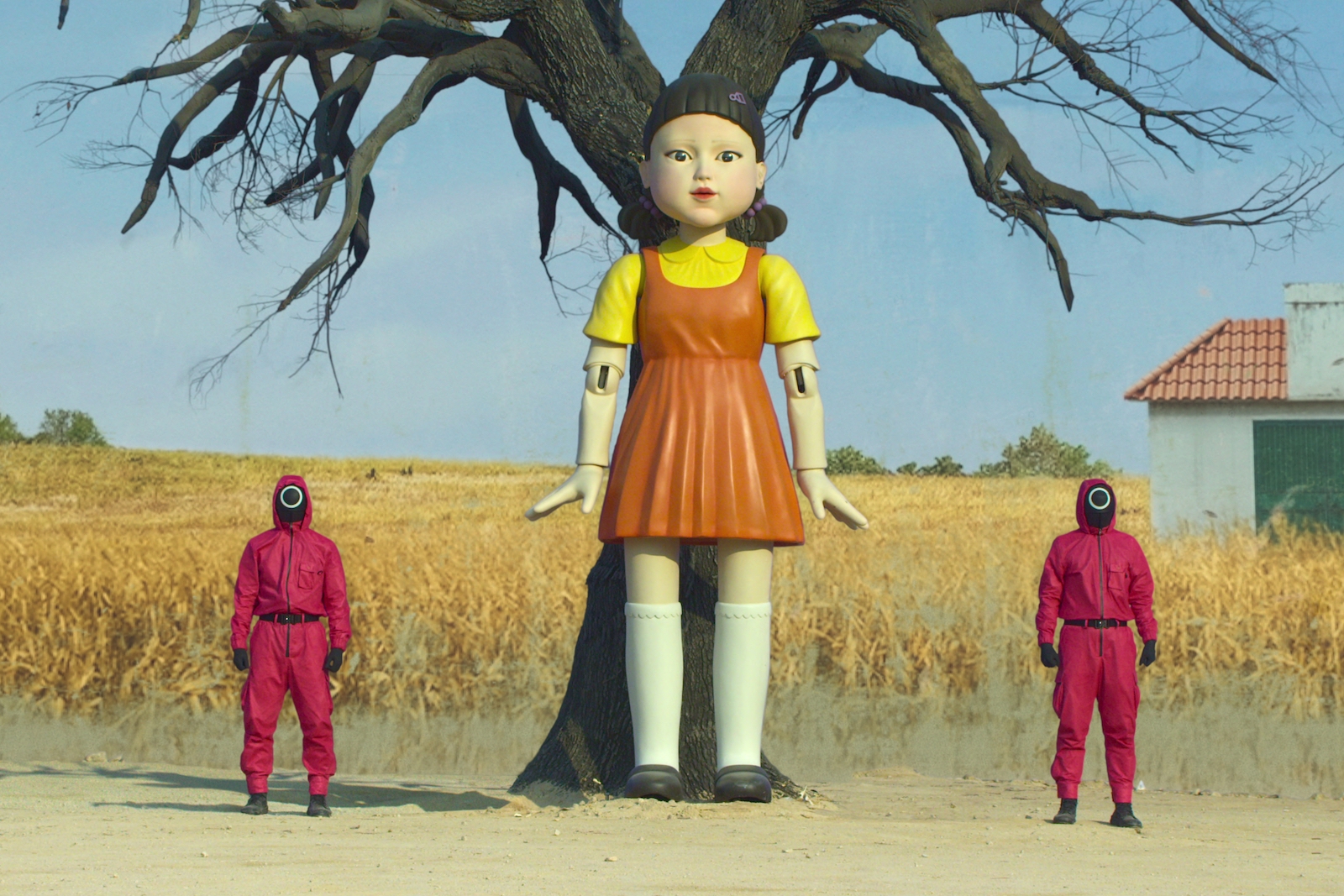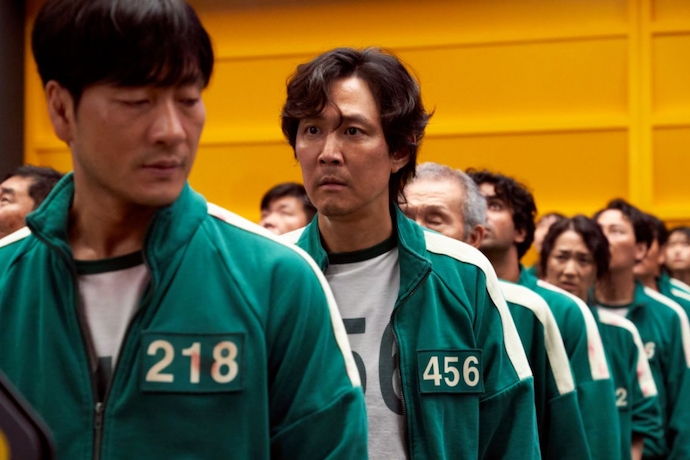
The Whole World Was Waiting for ‘Squid Game,’ The Breakout TV Show of 2021
Before I had even watched Netflix’s Korean TV series Squid Game, I saw Saturday Night Live’s parody country music video about it starring cast member Pete Davidson and guest Rami Malek. The two sing a song of woe and being broke virtually indistinguishable from countless other songs like it that have charted in the country genre. What makes this one different is there’s a new solution for their problems: “Yes, I’m broke and it’s a damn shame/Guess I gotta play the squid game.”
Davidson and Malek are then transported into the world of the megahit TV show, donning uniform green tracksuits, evading guards dressed in pink (“They got symbols on their faces like the ones on PlayStations/And the main guy looks like Doctor Doom,” Davidson remarks) and trying to survive every round of fatal children’s games that victims have to participate in order to be in the competition for what appears to be a whole lot of money (“45 billion won, that’s a whole lot of money,” Malek sings. “At least I think it is…I’m confused by the currency.”).
The song also addresses the cynicism of it all, the flippant way characters we grew to love were ultimately discarded. “And you go bye-bye now!” Davidson gleefully sings as he knocks Malek off a glass panel which invokes the show’s penultimate challenge.
The fact that Squid Game translated so easily into a country music song, even if through the parody of SNL, is evidence that there is a certain universality to it. The show speaks to a lot of anxieties people are having at the moment. It may be a South Korean production, but it has taken the world by storm. It is currently Netflix’s most-watched series, the top viewed program in 94 countries, a captivating sensation by every definition.
Yet, that this came so far out of left field reminds us of the joy of stumbling onto something genuinely new and different. Squid Game somehow feels like a lightning in a bottle situation, the result of persistent effort on the part of show creator Hwang Dong-hyuk, who wrote and directed all nine episodes thus far. He had written it in 2008, but it was rejected by studios for years until Netflix swooped in.
However, questions remain: did it break out simply because there wasn’t the usual competition from as many blockbuster movies given a Hollywood environment still reeling from the pandemic? Or was it simply a matter of good timing?
That’s what benefited fellow Netflix hit Tiger King when it was released in March 2020, perfect timing for a world that was entering a long quarantine time. Looking back at Tiger King now, I entertain the notion that maybe it wasn’t as special or addicting as we initially thought because we were all just collectively bored. However, in contrast, I believe that Squid Game broke out so big because it really is that phenomenal.
For those who don’t know, Squid Game follows Seong Gi-hun (Lee Jung-jae), who’s struggling with money, gambles a lot, and is a divorced dad wanting to do right by his daughter. Miraculously, after winning a single game of Korean flip game Ddakji against a mysterious stranger in a subway, he is invited to participate in a much larger competition with an exorbitant cash prize. The first game is a take on Red Light, Green Light featuring a large doll who spots anyone who moves during the Red Light with her high-tech array of cameras, and thus immediately snipes and slaughters them. That was the point where the show really grabbed me, I was genuinely shocked at the level of violence. It was the darkest first episode of a series since Black Mirror, which happens to be my favorite episode of that series.

But that was the point. It all serves to indicate to the audience that there is danger around every corner and that no one is safe. So you feel conflicted when you start to get attached to the characters you meet along the way, like Cho Sang-woo (Park Hae-soo), a former schoolmate of Gi-hun’s who studied at a prestigious university but nevertheless struggles with debt; Kang Sae-byeok (HoYeun Jung), a North Korean defector and pickpocket desperate to make a new life for her and her brother; Abdul Ali (Anupam Tripathi), a migrant worker from Pakistan; and a character that I feel I just fine referring to simply as the Old Man (O Yeung-su), whose mischievous smile conveys he always knows more than he lets on.
Meanwhile, the games have attracted the attention of police officer Wi Ha-joon (Hwang Jun-ho), who has infiltrated the facilities and poses as one of the guards, so that the audience gets to see a little bit more behind the scenes of how the games operate. This is one of the weaker parts of the narrative, we don’t get to know the character that much, and most of the time he’s just trying to blend in. Moreover, the twist involving his connection to the games seems hackneyed and ultimately not that important.
I think a couple of factors helped set Squid Game apart. The first is its visual style, Squid Game pops and has a visual flair not many other shows have. Colors radiate and have meaning, there’s a reason why the guards wear pink and the contestants wear green. The massive, central bunkbed-ridden room where the characters spend most of their time feels claustrophobic at first, before eventually feeling desolate as there are so few remaining characters by the end. I also love the haunting musical score, as distinctive as it is chilling. The imagery and sounds of the show stick with you long after you’ve completed watching it.
Many, including those involved in the show, have admitted that another appeal of the show is the deadly versions of childhood games. It is a horrifying notion, the nostalgia one has for these sorts of games versus the horror we witness our set of characters go through. Harmless games like tug-of-war or marbles become fatal challenges and require more forethought or strategy than they used to.
However, it’s the show’s somewhat cynical portrait of humanity that I think has resonated the most. This is most apparent in the show’s second episode, where after voting not to participate any longer after the massacre of the first game, the surviving contestants go back out into society and realize that at least when they’re playing the games, they have a fighting chance. This doesn’t seem to be the case in an indifferent, uncaring world. So, they all almost universally choose to return to the competition.
But, the show isn’t perfect and does have flaws. Most notably, people have complained extensively online about the VIP characters who show up to watch the final rounds of the games. The whole segment of the show featuring them is awkward and poorly acted, especially in comparison to the rest of the show.
Much like Parasite before it, here is another South Korean production that, at its core, is about economic inequality that has captured the attention of the entire world. Here in my native Northern Virginia, many local Korean restaurants and stores are selling dalgona, the easily breakable treat featured on the show as the second challenge the contestants must get through. The masked guards were a popular Halloween costume this past year. The show’s stars have made appearances on American talk shows, HoYeun Jung was featured on the cover of Vogue, and the stars’ messages to fans have gone viral on Reddit and TikTok. It’s rare that a show captures the zeitgeist so effectively in only its first season.
And that’s the thing: if anything, I would prefer the show to remain as it is and not have additional seasons, which have recently been confirmed to be in development. Many Netflix original series, including Stranger Things, House of Cards, Orange Is the New Black, Making a Murderer, and yes, even and especially Tiger King, all had massively popular and acclaimed first seasons only to lose that momentum over additional seasons or subsequent follow-ups. I’m admittedly worried that this singular phenomenon will suffer the same fate. I feel fine with the story as is, even if it ends on somewhat of a cliffhanger.
In the here and now, however, Squid Game excels because of its uniqueness, its ability to be easily binged, and the underlying message, its well-executed critique of capitalism. The word I’m hearing is that other streaming platforms, like Disney+ and HBOMax, are following Netflix’s model of investing in regional content that can find a global audience following the success of the show. I hope that the gates have been opened and that new creators and ideas from all over the world have the opportunity to break out as big as Squid Game did.

